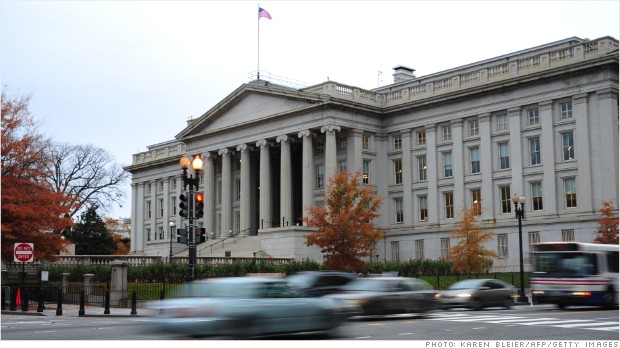Senate Majority Leader Harry Reid said negotiators could reach a U.S. budget deal today that would protect all but top earners from a tax increase at midnight.
 |
| With taxes set to increase for almost every U.S. worker at midnight, there is still no agreement and gaps between the two parties remain. Photographer: J. Scott Applewhite/AP Photo |
“They’re progressing,” Reid, a Nevada Democrat, said of the talks in an interview as he entered the Capitol this morning. Asked if he thought a deal could be reached today, Reid said, “I really hope so. We’re not there yet, though.”
There is still no agreement and gaps between the two parties remain. Republicans and Democrats were narrowing the annual income level at which tax rates would increase in 2013 to between $400,000 and $500,000.
Progress picked up after a weekend of private talks and public sniping as lawmakers sought to avert more than $600 billion in tax increases and spending cuts that make up the so- called fiscal cliff. Even if a deal is reached and can get through both chambers of Congress, it would be more limited than President Barack Obama and leaders of both parties sought. It would set up another battle early in 2013 over the budget and the federal debt limit.
Senate Minority Leader Mitch McConnell said he and Vice President Joe Biden spoke at 12:45 a.m. and 6:30 a.m. today. As he arrived at his office, McConnell, a Kentucky Republican, gave reporters no indication of whether there was movement toward a deal.
Income Tax Rates
Talks between Reid and McConnell stalled yesterday because of disputes over income tax rates, the estate tax and other issues. McConnell reached out to Biden in an effort to break the impasse, while staffers worked into the night trading and reviewing offers.
Representative Chris Van Hollen of Maryland, the top Democrat on the House Budget Committee, told Bloomberg Television today that the odds of reaching a deal are “a little better than 50-50” while noting that “a lot has to go right.”
The Senate reconvenes today at 11 a.m. Washington time. Reid said yesterday on the Senate floor that there would “perhaps” be further announcements then. “I certainly hope so,” he said.
The Standard & Poor’s 500 Index fell 0.3 percent to 1,398.34 at 9:32 a.m. in New York. The benchmark 10-year Treasury bond yield increased two basis points, or 0.02 percentage point, to 1.72 percent at 9:35 a.m. in New York, according to Bloomberg Bond Trader prices.
Bush Tax Cuts
Tax cuts first enacted during George W. Bush’s presidency are scheduled to expire tonight. Obama and other Democrats have sought to extend the reductions for married couples’ income up to $250,000 a year while letting tax rates rise for income above that amount. Republicans oppose tax rate increases for any income level.
“The sticking point appears to be a willingness or interest or frankly, the courage to close the deal,” McConnell said on the Senate floor yesterday. “I’m willing to get this done, but I need a dance partner.”
Illinois Senator Dick Durbin, the second-ranking Democrat, said unresolved issues include the income threshold at which tax rates would rise, expiring estate tax levels and how to prevent an expansion of the alternative-minimum tax. Democrats, who represent many of the high-tax states where the AMT has the biggest bite, want to permanently limit its reach.
Capital Gains
There is a direct relationship between the income level at which higher taxes will begin and the estate tax, said a Senate aide familiar with the negotiations.
The higher the threshold for an income tax increase, the more Democrats want Republicans to relent on estate taxes, the aide said. Republicans want to keep estate taxes at current levels, with a $5.12 million per-person exemption and 35 percent top rate; some Democrats agree with this. Obama wants a $3.5 million exemption and 45 percent top rate.
Durbin also said there is a debate over raising the rate for capital gains and dividends from 15 percent to 20 percent. The issue is at what income level the rate would jump to the higher percentage, he said.
According to a person familiar with the talks who asked for anonymity when discussing them, Democrats are pushing for an income level as low as $250,000 as a trigger for a 20 percent tax rate on capital gains and dividends. Taxpayers with income levels below $250,000 would still pay a capital gains and dividend tax rate of 15 percent, the person said.
Capital Gains
Without a deal, the capital gains tax rate for top earners is scheduled to rise 20 percent and dividends would be taxed as ordinary income. With or without a deal, top earners will pay an additional a 3.8 percent tax on capital gains and dividends under the 2010 health-care law.
Lawmakers haven’t said whether any deal would include provisions to halt a cut in Medicare payments to doctors.
Durbin told reporters yesterday that Republicans had offered to let tax cuts expire on household income over $500,000. Democrats countered with a $450,000 threshold.
“People are coming around to about a $500,000 threshold,” Senator Kay Bailey Hutchison, a Texas Republican, told reporters.
House Speaker John Boehner, an Ohio Republican, brought his members back to Washington yesterday, though he has said the House won’t act unless the Senate sends over a proposal.
“We’re waiting to see if the Senate does anything,” said Representative Buck McKeon, a California Republican.
Recession in 2013
Allowing the fiscal changes to take effect would cause a recession in the first half of 2013, according to the Congressional Budget Office.
During an interview broadcast yesterday on NBC’s “Meet the Press,” Obama made a last-minute appeal for compromise and warned of “an adverse reaction in the markets” if Congress doesn’t act.
Republicans “say that their biggest priority is making sure that we deal with the deficit in a serious way, but the way they’re behaving is that their only priority is making sure that tax breaks for the wealthiest Americans are protected,” Obama said. He said his offers to Republicans have been “so fair that a lot of Democrats get mad at me.”
In a statement, Boehner called Obama’s comments “ironic, as a recurring theme of our negotiations was his unwillingness to agree to anything that would require him to stand up to his own party.”
Expressing Frustration
The Reid-McConnell talks broke down publicly yesterday with both leaders coming to the floor to express frustration at the lack of progress.
Reid attributed the setback to a Republican insistence on using a new inflation measure that would lead to smaller Social Security cost-of-living increases. Republicans later said they had stopped advocating the formula change.
“It’s not a winning argument to say benefits for seniors versus tax breaks for rich people,” Senator John McCain of Arizona told reporters.
Several Senate Republicans leaving yesterday’s caucus meeting said McConnell told them the talks stalled because Obama insists on using revenue generated from higher tax rates on the wealthy to reduce the spending cuts scheduled to begin in January.
Senator Bob Corker, a Tennessee Republican, said new revenue should go instead to deficit reduction. Democrats “want to spend it all now,” he said.
New Revenue
Democrats have said for more than a year that new revenue should be used to turn off the spending cuts. That was the basis of their proposals in last year’s failed talks by a deficit- reduction supercommittee.
Boehner may be hesitant to work with Democrats to advance a measure that raises taxes just days before he has to stand for re-election as speaker in the next Congress.
In the event the Senate can’t reach a compromise, Obama has asked Reid to ready a bare-bones bill for a vote today to extend expanded unemployment benefits and tax cuts on family income up to $250,000.
In that scenario, Obama said on NBC, “Republicans will have to decide if they’re going to block it, which will mean that middle-class taxes do go up.” Any compromise needs to be passed by the Republican-controlled House.
Defense Layoffs
South Carolina Senator Lindsey Graham, a Republican, said he had discussed the effect of spending cuts on the U.S. military with Defense Secretary Leon Panetta and was told that it would mean 800,000 layoff notices at the beginning of the year. The result would be destroying “the finest military in the world at the time we need it the most,” Graham said.
If Congress does nothing, taxes will rise in 2013 by an average of $3,446 for U.S. households, according to the nonpartisan Tax Policy Center in Washington.
Tax filing for as many as two-thirds of U.S. taxpayers could be delayed into at least late March. Defense spending would be cut, and the economy would probably enter a recession in the first half of 2013, according to the Congressional Budget Office.
The effects of the higher tax rates and federal spending cuts would accumulate over a matter of months. Congress could reverse them by acting retroactively in 2013.



















